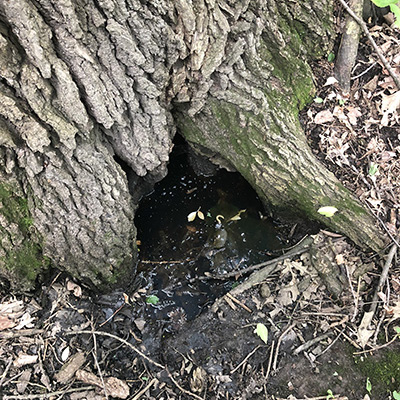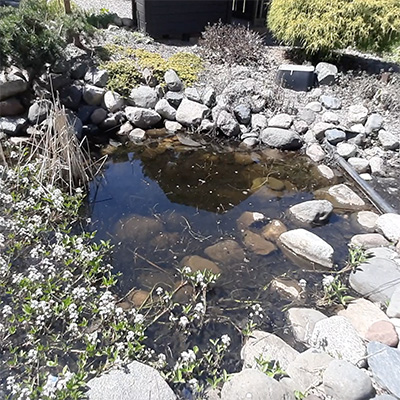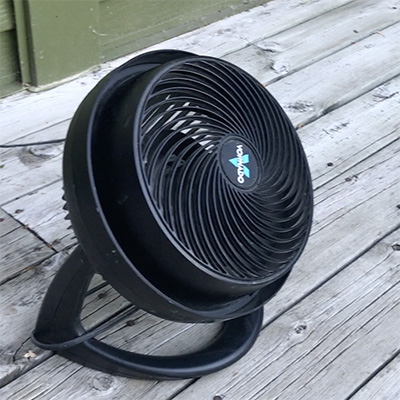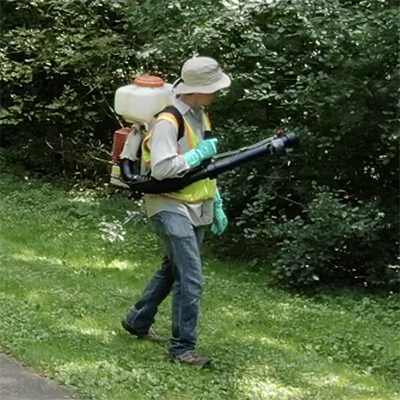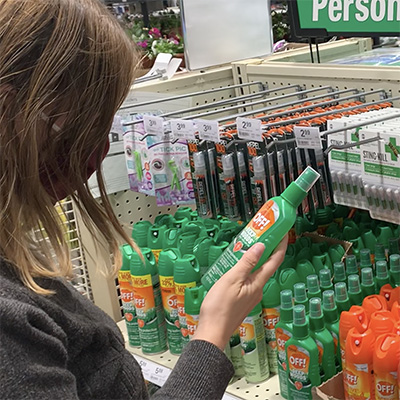Tips for a Mosquito-Free Yard
We have received lots of inquiries from residents looking for quick do-it-yourself mosquito control methods so we have developed this homeowners guide to help everyone. There are a number of steps that homeowners can take to reduce annoyance from mosquitoes including source reduction, material treatments, physical barriers, and wearing appropriate clothing and repellents. Follow the steps below and contact us if you need any more details!
1) Eliminate Mosquito Breeding Sources
The best way to eliminate mosquitoes is to get rid of their breeding habitats. Mosquitoes look for any standing water to lay their eggs and most backyards have a variety of sites where they can flourish. Check your yard frequently for anything that could hold water. Below are some of the common mosquito-breeding locations along with solutions:
LANDSCAPE PONDS
Ponds may add a decorative flair to your backyard, but they can also be a breeding ground for mosquito larva especially if they are shaded or if the water isn't cycled through with a pump. Solution: There are a couple of options for backyard ponds: 1) Stock the pond with small fish that would eat mosquito larva, 2) Empty the ponds and refill with fresh water once a week, 3) Purchase a pellet designed for larval control and use in the pond (see below).


BIRD BATHS
The stagnant water in a bird bath is a perfect breeding site for mosquito larva. Take a few steps to make sure that your bird baths are enjoyed only by your feathered friends and not biting pests. Solution: Refresh the water in your bird bath at least once per week.
OLD TIRES
Tires are one of the most common breeding sources for some of the most dangerous species of mosquitoes. Rubber tires hold water easily, they stay warm in the Summer, and they can be hard to empty. Solution: Contact us today and we will remove tires (that do not have rims) at no cost. You can also contact your county's environmental center or local auto repair shops, which will often recycle tires for a fee.


TARPS OR CONTAINERS
Sometimes you may have a mosquito breeding site in your backyard without even knowing it because of a tarp, flower pot, or bucket that happens to be holding water. Check your yard frequently to see what could be holding water after a rain. Solution: Dump the water out and remove the container or tarp when possible. If it's not possible to remove a container that holds water, just be sure to cover it before it rains.
TREE HOLES
One common mosquito breeding ground that people forget to check is trees that may contain holes that hold water. Check high and low on any older trees to see if there are any openings. Solution: Fill the holes with sand or an expandable foam that can be purchased at your local hardware store. You can also contact a local tree removal service or arborist.


CLOGGED GUTTERS
Gutters are not designed to hold water, but once in a while - especially in the Spring and Fall they can become clogged and water will either stop draining or drain slowly. Solution: Check your gutters several times a year to ensure there are no clogs and water is not sitting.
NEGLECTED POOLS
When properly maintained and regularly used, swimming pools don't pose a risk for breeding mosquitoes. However, neglected in-ground pools, hot tubs, or inflatable pools are mosquito larva hot spots. Solution: Use chlorine and regularly maintain your pool. Empty toy pools when not in use.


RAIN BARRELS
Having a gutter empty into a rain barrel is a great way to save water for irrigation and gardening. However, be careful not to let an open rain barrel become a breeding ground for mosquitoes. Solution: Cover your rain barrel or purchase a screen that's small enough to prevent mosquitoes from entering. Also ensure the rain barrel gets emptied a couple of times each season.
LOW SPOTS
Sometimes there are low spots in your yard that tend to hold onto water for days after a big rain. These may seem mostly harmless, but if water tends to stand undisturbed for more than three days, these spots could produce mosquitoes. Solution: Fill these areas in and level out your yard or use larval control.

2) Control Mosquito Larvae
For water that you cannot eliminate like a landscape pond or small wetland, consider purchasing larval control materials to reduce mosquito larvae. Most home improvement stores offer larval control in the form of dunks, pellets, or bits. Larval control materials are usually dry and should be applied to a wetland according to the label. Remember, not all wetlands will contain mosquito larvae - if your pond is deep with only a thin band of cattails around the edge, it probably does not need to be treated. When you purchase larval control materials, here is what you should look for:

Bti (Bacillus thuringiensis israelensis)
Bti is a biological or a naturally occurring bacterium found in soils that targets mosquito, fungus gnat, and black fly larvae with almost no discernible impact on any other species. Bti is commonly sold in donut shaped dunks or as granules that can be deposited in water. Different formulations have varying styles of application and effective periods, so always read the label before doing an application. Read more about Bti at the Environmental Protection Agency.
Methoprene
Another effective larval control material is methoprene, which is an insect growth regulator that disrupts a mosquito's life cycle. Methoprene is usually sold in the form of pellets or briquettes and has a longer effective period than Bti. Methoprene is best used in artificial ponds or uncovered rain barrels, where mosquitoes could lay eggs at any given time. Read more about methoprene at the National Pesticide Information Center.

3) Use Physical Barriers
One of the simplest ways to reduce mosquito annoyance is to make physical adjustments to your yard or seating areas to reduce the likelihood that they will come near people. Here are some ways to do that:
Keep Grass Short and Reduce Overgrown Shrubs
During the daytime hours mosquitoes hide out from the sun on the underside of plants where there is shade. Vegetation management around the house can reduce the number of adult mosquitoes. Keep your grass under 2 inches in length and reduce overgrown shrubs and other vegetation to avoid giving adult mosquitoes harborage.


Check Screens, Create Barriers, and Turn on a Fan
A simple way to reduce bites is to make it more difficult for mosquitoes to get to you. Check your screens to make sure there aren't any holes or openings. If you have an outdoor seating area, consider purchasing a screened in porch that you can put up during peak mosquito hours. Mosquitoes are weak fliers, so turning on a fan can go a long way at keeping them away and will also provide some relief from the heat on sweltering summer nights.
Mosquito Traps and Natural Predators
Some traps that use CO2 to lure mosquitoes can be effective in reducing them. Be wary, however, as many mosquito traps sold in stores make claims that are not proven - do your research before you make any purchases. There are natural mosquito predators like bats and purple martins and you can install a bat house to promote them near your property. Don't expect either of these predators to make a significant impact in the mosquitoes in your yard, however, as they mostly prefer larger insects.

4) Control Adult Mosquitoes
Some species of adult mosquitoes can travel for miles, so sometimes controlling and eliminating larvae is not enough. Adult mosquitoes can be controlled using a few different do-it-yourself methods, but keep in mind most of these products are risky and could cause harm to non-target insect species if not applied according to the instructions on the label. Because most urban and suburban yards will not need adult mosquito control, we are not listing specific products, but feel free to call us if you need advice on treating your property.

Use a Backpack or Hand Pump Sprayer for Residual Treatment
During the evening when the sun goes down and the temperature and humidity decrease, mosquitoes emerge from their daytime resting spots and settle on the vegetation at the edge of a woodlot where they use their senses to detect where to find a bloodmeal. Treating this vegetation with a residual material can be effective way of reducing adult mosquitoes. Purchase products meant for residual mosquito treatment and use a gas or electric powered backpack or a hand pump sprayer to treat the vegetation where mosquitoes are likely to land. Read the label to ensure the correct concentration and droplet size - more product does not mean more effective! Be sure to avoid flowering plants and weeds and keep a buffer from any body of water.
Use a Fogger for a Quick Knock Down
Yards without excess mosquito harborage or vegetation might be more effectively treated with a fogger that offers a non-residual "knock down" treatment. Handheld foggers are usually powered by a propane cartridge and larger versions may be attached to a backpack. These treatments are the most effective at peak mosquito activity time in the evening right after the sun goes down. Follow the label for instructions on when to best use the product and avoid applying near water.


Consider Hiring a Professional
Many adult mosquito control products are risky and can cause harm to beneficial pollinators, fish, and other non-target species, which is why it is critical that they are used sparingly and according the safety and environmental guidelines on the labels. If you don't feel comfortable applying these products yourself, consider calling a licensed professional. The Minnesota Department of Agriculture offers pesticide licensing and you can use their license lookup webpage to view individuals and companies near you. Select your county and for "License Type" choose "Commercial Pesticide Applicator - Mosquitoes, Black Flies, and Ticks"
Click here to view the License Lookup page on the MN Department of Agriculture website
5) Use Personal Protection
The most effective way to avoid getting bitten by mosquitoes is to protect yourself, your kids, and your pets because these methods will remain effective even when you leave your yard. Before venturing out to go hiking, camping, or just to enjoy your deck on a summer evening, we recommend you take the following steps.
Use an EPA Registered Insect Repellent
There are many great insect repellents that come in the form sprays or wipes, so do your research and find the best product that works for you. The active ingredient that we recommend is DEET (no more than 30%) which is effective and safe for all ages. Other recommended ingredients include picaridin, IR3535, and oil of lemon eucalyptus. Be wary of "natural" bug sprays as many have not been scientifically proven to be effective against mosquitoes. Always put on bug spray last after sunscreen or any other lotions.


Pre-Treat Clothing and Gear with Permethrin
An effective way to prevent getting bitten by mosquitoes and ticks is to purchase a spray containing the active ingredient permethrin and using it to treat clothing and gear. Spraying your shoes, socks, and pants makes it less likely that ticks or mosquitoes will attach near your ankles, which is a favored spot for both insects. Follow the label instructions on how to apply the product, which should be done before clothes are worn.
Wear Long, Loose, Light Clothing and Avoid Scents
Most mosquitoes and black flies don't bite through clothing so wear long sleeves and pants that are loose-fitting. Mosquitoes are attracted to dark colors, so lighter is better. Avoid artificial scents like shampoos and perfume because mosquitoes are attracted to these smells. For an added layer of protection, tuck your pants into your socks to eliminate exposed skin near the ankles.


Avoid Being Outdoors at Dusk and Dawn
Timing is everything and mosquitoes are the most active during the hour surrounding sunset and sunrise. This might be the time to go indoors or find a screened in area where they cannot get to you. If you'd prefer to stay outdoors, this prime activity period would be a good time to add an extra layer of bug spray and follow all of the tips outlined above.
Questions or comments about any of the above tips? Contact Us and we will respond as quickly as possible. Use our Submit a Tip form on our contact page to let us know about high mosquitoes in your area, request a pickup of waste tires, or report a breeding site that you think is not being monitored.

